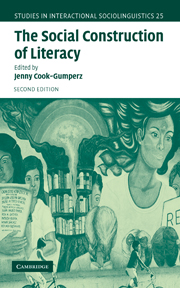Book contents
- Frontmatter
- Contents
- List of figures
- List of tables
- List of contributors
- Preface
- Acknowledgments
- 1 The social construction of literacy
- 2 Literacy and schooling: an unchanging equation?
- 3 Interactional sociolinguistics in the study of schooling
- 4 The language experience of children at home and at school
- 5 Narrative presentations: an oral preparation for literacy with first graders
- 6 Differential instruction in reading groups
- 7 Organizational constraints on reading group mobility
- 8 Developing mathematical literacy in a bilingual classroom
- 9 Spoken language strategies and reading acquisition
- 10 Speaking and writing: discourse strategies and the acquisition of literacy
- 11 The implicit discourse genres of standardized testing: what verbal analogy items require of test takers
- References
- Author index
- Subject index
1 - The social construction of literacy
Published online by Cambridge University Press: 05 June 2012
- Frontmatter
- Contents
- List of figures
- List of tables
- List of contributors
- Preface
- Acknowledgments
- 1 The social construction of literacy
- 2 Literacy and schooling: an unchanging equation?
- 3 Interactional sociolinguistics in the study of schooling
- 4 The language experience of children at home and at school
- 5 Narrative presentations: an oral preparation for literacy with first graders
- 6 Differential instruction in reading groups
- 7 Organizational constraints on reading group mobility
- 8 Developing mathematical literacy in a bilingual classroom
- 9 Spoken language strategies and reading acquisition
- 10 Speaking and writing: discourse strategies and the acquisition of literacy
- 11 The implicit discourse genres of standardized testing: what verbal analogy items require of test takers
- References
- Author index
- Subject index
Summary
Educational institutions, their promises and limitations were at the center of public debate for most of the twentieth century. Now in the twenty‐first century schooling continues to be seen as an institutional force both for bringing about social change and for providing stability. When outcomes are not as expected or when desired transformations do not come about, then the problems are seen as directly attributable to educational failure. Over the past hundred years of universal schooling, literacy rates have served as a barometer of society such that illiteracy takes on symbolic significance, reflecting any disappointment not only with the workings of the educational system, but with the society itself. An assumption often expressed is that if educational institutions cannot manage the simple task of teaching basic decoding and encoding skills, they cannot prepare future generations to deal with more complex questions of technological change (Kozol 1985). However, literacy needs to be seen as providing not just technical skills but also a set of prescriptions about using knowledge. In this sense literacy is a socially constructed phenomenon, not simply the ability to read and write. As this book demonstrates, by performing the tasks that make up literacy, we exercise socially approved and approvable talents. Literacy as socially constructed is both a historically based ideology and a collection of context‐bound communicative practices.
An historical view of literacy begins in early modernity when literacy became regarded as a virtue, and some elements of such moral virtue still seem to attach to its use.
- Type
- Chapter
- Information
- The Social Construction of Literacy , pp. 1 - 18Publisher: Cambridge University PressPrint publication year: 2006
- 7
- Cited by



